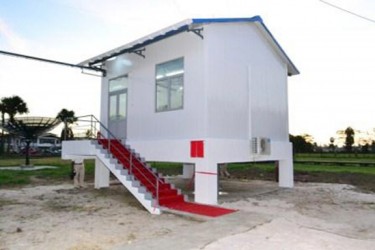Pressure continues to build on the Guyana Government over the granting of a broadcast licence to China Central TV with the Georgetown Cham-ber of Commerce and Indus-try (GCCI) being the latest to voice concern on the matter.
Thus far, the private sector had been silent on the granting earlier this month of a 24-hour broadcasting licence to CCTV on dubious grounds.
In a statement yesterday, the GCCI expressed “considerable concerns” over the process that led to the granting of a television licence and broadcast spectrum frequency to the Chinese Government. The Chamber said that the process utilised appears to have been conducted without the necessary regulatory requirements and principles that should be followed in the issuance of such a licence. “While the Chamber acknowledges that China is a very important development partner, the government of Guyana should ensure that due process is followed and the laws of Guyana (are) observed when brokering agreements with domestic and foreign entities. Moreover, the government has to guarantee that equitable, fair and transparent procedures are applicable to all applying for statutory licenses. Our private sector companies are all expected to follow such statutory guidelines,” the Chamber asserted.
It argued that the National Frequency Management Unit (NFMU) has the responsibility of efficiently and effectively managing the electromagnetic frequency spectrum and receiving and processing applications for licenses for broadcast services.
It also noted that the recently formed Guyana National Broadcasting Autho-rity (GNBA) under the Broad-cast Act of 2011 has responsibility for the granting of television licences.
The Chamber said that from the statements coming from the Government on the granting of the Chinese Broadcast Licence, “it appears that none of these agencies were involved in the processing of the approved license. This represents a worrying development and one that the Chamber admonishes if it is proved that the statutory procedures were not followed.”

The Chamber said it would welcome statements from both the NFMU and the GNBA on this issue.
Broadcast expert Kit Nascimento and veteran broadcaster Enrico Woolford have queried the grounds on which the licence has been granted. Nascimento has raised the question of how, what are propaganda broadcasts from a foreign country could serve Guyana’s interests and what mechanisms are in place for content regulation among other issues. Woolford has questioned how the finite electromagnetic spectrum could be accessed by a foreign government when many locals have applied for licences and have not been granted.
Though the Act creating the GNBA has been pilloried, critics have noted that even they had been bypassed in the delivering of a licence to CCTV. This bypassing has been underscored by Head of the Presidential Secretariat (HPS), Dr Roger Luncheon who asked rhetorically at a press conference on Thursday “…But obviously if they’re instructed what do you think they would do? If you were the managing director of NFMU and the HPS called you and said we’ve just agreed with the People’s Republic of China to broadcast the signals and…, they have selected a channel to do so, could you please go ahead and assign a channel, you think he’s [the Head of NFMU] going to tell me [Luncheon] that you got to apply and all of those things? I doubt it.”
Nascimento later decried this as an admission by the government that it had broken the law in relation to the CCTV licence.



